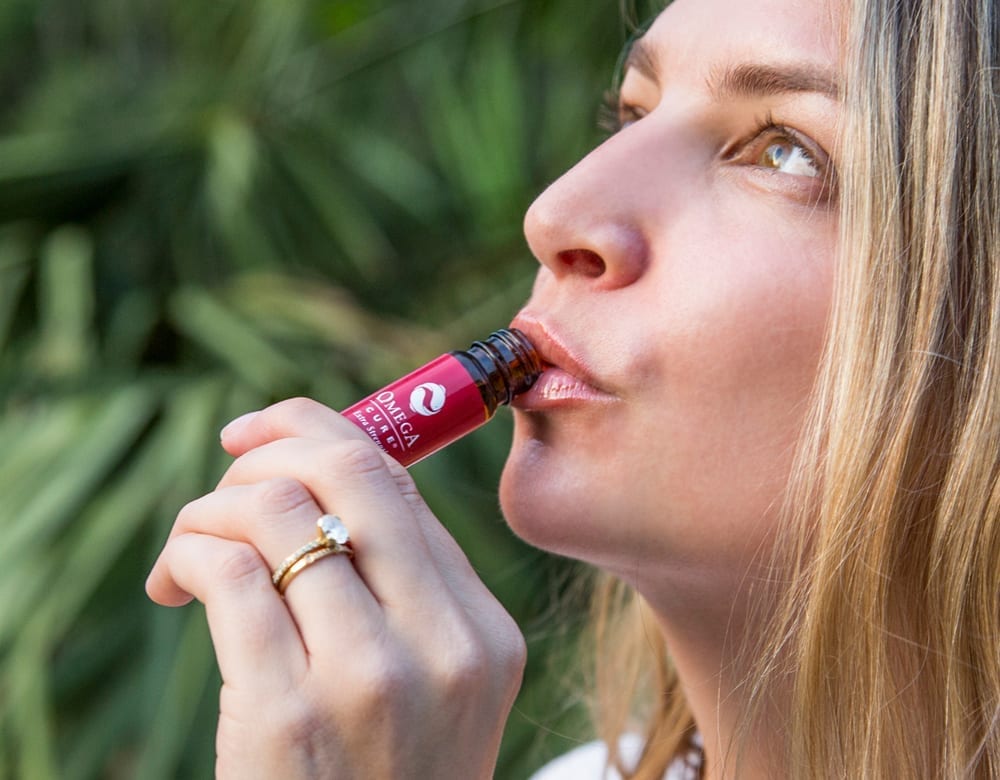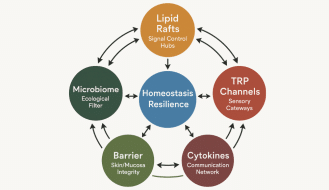Microbiome Basics: How to Nurture Your Gut Bacteria
Unless you’ve been living under a rock recently, you’ve probably heard a thing or two about the microbiome — you know, the 1.5 kg community of microbes living in and on you. The microbiome is currently a hot health topic, receiving plenty of attention for its role in regulating disease.
While it’s an exciting frontier in science, there are still a lot of questions about this community of bacteria and how they influence our health. Let’s tackle the basics.
What Is the Microbiome?
The microbiome refers to the trillions of bacteria that live in or on our bodies, including all of their genes. Located primarily in the gut, these microbes have at least 150 times more genes combined than we do. These genes collaborate with our own in running our bodies and provide us with a greater genetic diversity important to the survival of the human species.
The gut microbes help us in many ways. They break down the leftovers after the stomach and small intestine have done their job, converting the remains into energy. They also feed the cells lining the colon, manufacture vitamins and other nutrients, break down toxins, and train our immune system. In other words, they are critical to a well-functioning body and a healthy immune response.
Why Does Microbial Health Matter?
In simple terms, a healthy microbiome is characterized by two key traits: Having a variety of bacteria (the more diversity, the better), and the right kinds of bacteria.
The problem is, we as a society are disrupting the balance of the microbiome. We wash our hands with disinfectants and swallow antibiotics when we have a cold; our social and economic policies discourage women from breastfeeding; and to top it all off, we overload our bodies with fast foods high in bad fats, simple sugars and low levels of dietary fiber.
All of these factors contribute to dismantling the diversity and healthy types of microbes in our gut. And new research shows that imbalances in the gut bacteria are linked with diseases like Irritable Bowel Syndrome, autoimmune disease, diabetes, colon cancer, autism, allergies, asthma and mood disorders.
Good Versus Bad Gut Bacteria
It is tempting to classify certain bacteria as “good” and others as “bad.” But as Ed Young points out in his book, I Contain Multitudes, “There are no clear heroes and villains in the world of microbiology.”
The microbiome is affected by factors such as age, genetics, environment and diet. Consequently, a type of bacteria that can restore microbial health in a 5-year-old might create havoc for the same person at age 70. It all depends on the context. For example, the bacterial strain Helicobacter pylori seems to have a protective effect in childhood, but has been associated with ulcers and even cancers later in life.
All of these foods are good sources of dietary fibers, which are important for keeping the gut microbes healthy.
Foods that Promote Microbial Health
Our microbiome can wander astray when we fail to feed it the right kinds of foods. Saturated fats feed inflammation-creating bacteria, as do sugars and other elements used in processed foods.
Dietary fibers and fermented foods, on the other hand, provide nourishment for healthier bacteria species and support a more varied microbial community. Getting on a high-fiber diet — including oats, barley, onions, tomatoes, squash, peas, lentils, garlic, bananas and mangoes — provides a variety of excellent plant carbohydrates. These foods in turn provide the raw material for bacterial fermentation. In addition, when you eat more fiber, the gut bacteria produce short-chain fatty acids, which feed the cells lining your gut.
This is one reason why going on a low-carb diet might not be the best idea. Extremely low-carb diets can result in getting too little dietary fiber, in turn decreasing microbe diversity.
How Omega 3 Impacts Gut Bacteria
Along with dietary fibers, other types of nutrients are also beneficial, including omega-3 fatty acids.
Studies have found that higher intakes of omega-3s are linked with greater microbial diversity, independent of dietary fiber intake. In addition, omega-3s seem to particularly support the Lachnospiraceae bacterial family, which may help protect against colon cancer.
Research indicates that getting omega-3s through liquids or foods might have a greater impact on the gut microbiota than capsules, even when the same dose is consumed.
Omega-3s are beneficial for gut health in other ways too. Researchers have found that, besides possibly increasing microbial diversity, omega-3s also help increase the production of short-chain fatty acids. In addition, animal studies indicate that omega-3s help maintain the integrity of the intestinal wall and interact with host immune cells.
While there is more research needed to clarify the role of omega-3s in the microbiome, these results are promising. However, it is also important to note that how you go about increasing your omega-3 intake probably makes a difference. For instance, in one study, the researchers compared the effects of supplementing patients with 4000 mg of EPA/DHA either via capsules or a functional food drink. The researchers found that the functional food drink had a greater impact on the gut microbes, increased the amount of two important, health-promoting bacterial strains.
This research could in part explain why increasing omega-3 intake via fish oil capsules is often found to be less effective than other types of supplementation and eating fish.
Other Factors that Influence Gut Health
Keeping your microbiome healthy is not just about diet. There are many factors that play a role, starting at birth.
Getting inoculated with a good dose of bacteria as we exit the birth canal is one important way to set up microbial health from day one. For instance, it is known that babies born vaginally get colonized with the Lactobacillus bacteria, while babies born by C-section are first introduced to less healthy hospital bacteria. This early exposure is a critical early step in the development of our immune system.
Similarly, breast feeding sets the stage for a good immune system. Breast milk not only has the perfect nutrition for a baby, but it also contains the perfect food for feeding the baby’s bacteria — specifically Bifidobacterium longum infantis, or Binfantis for short. This bacteria protects against harmful microbes, so it is an essential part of the baby’s defense system. Moreover, Binfantis feeds the infant’s gut cells by releasing short chain fatty acids. It also prompts the gut cells to make adhesive proteins that seal the gaps between cells in the gut lining.
A person’s future microbial health is strongly impacted by their earliest exposure to bacteria.
It has also been postulated that our pursuit of cleanliness reduces microbial health. Urbanization with smaller families, concrete city blocks, chlorinated water and sanitized food, and a lack of closeness to animals have reduced our exposure to a wider range of bacteria. In fact, lack of microbes seems to be consistently linked with a higher risk of allergic reactions and inflammatory diseases. This can also explain why studies have shown that children with older siblings, or dogs, seem less likely to be bothered by hay fever and other allergies.
Finally, many of microbiome experts advise that we reduce the overuse of disinfectants and antibiotics as a way to promote microbial diversity.
Feeding Your Microbiome with Omega-3 and Fiber
Here at Omega3 Innovations, we strive to make good nutrition more accessible via our Omega Cure® oil. It’s powerful in its own right, or combined with fiber (as in the case of our Omega Cookie® and Omega Passion® chocolates). These products contain solid doses of dietary fiber and omega-3s with limited amounts of added sugars.
Whatever you choose to eat, keep it wholesome and fiber-rich. Your bacteria will thank you for it.
An Effective Omega-3 Dose, Made Simple
Experience the Omega3 Innovations difference for yourself with the most effective fish oil supplement on the market.
Buy Now
References:
Arranga, T. (2013). Bugs, bowels, and behavior: the groundbreaking story of the gut-brain connection. New York, NY: Skyhorse Publishing.
Chutkan, R. (2015). The microbiome solution: a radical new way to heal your body from the inside out. New York, NY: Penguin Publishing Group.
Colleen, A. (2015). 10% human: how your body’s microbes hold the key to health and happiness. New York, NY: HarperCollins Publishers.
Costantini, L., Molinari, R., Farinon, B., & Merendino, N. (2017). Impact of Omega-3 Fatty Acids on the Gut Microbiota. International Journal of Molecular Sciences, 18(12), 2645.
Noriega, B. S., Sanchez-Gonzalez, M. A., Salyakina, D., & Coffman, J. (2016). Understanding the Impact of Omega-3 Rich Diet on the Gut Microbiota. Case Reports in Medicine, 2016, 3089303.
Enders, G. (2015). Gut: the Inside story of our body’s most underrated organ. Vancouver, B.C: Greystone Books.
Holscher, H. D. (2017). Dietary fiber and prebiotics and the gastrointestinal microbiota. Gut Microbes, 8(2), 172–184.
Menni, C. et al. (2017). Omega-3 fatty acids correlate with gut microbiome diversity and production of N-carbamylglutamate in middle aged and elderly women. Scientific Reports, 7, 11079.
Yong, E. (2016). I contain multitudes: the microbes within us and a grander view of life. New York, NY: Ecco / HarperCollins Publishers.
Popular posts



Related posts









